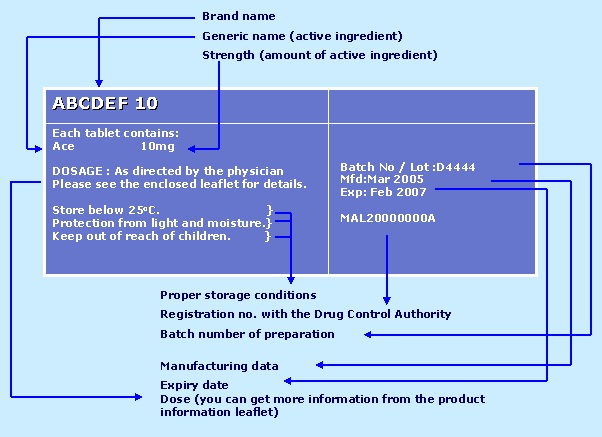It is important for an individual to understand the label or package insert of a medicine before taking the medicine. Read medicine labels carefully to avoid any medication error.

The Expiration Date on Medicines Labels
The expiration date of a medicine is available on the medicine label. Expiration date is displayed on the prescription or non-prescription medicine label by the manufacturer to ensure that the medicine attains the appropriate standard for identity, viscosity, quality and purity at the moment it is to be used.
The expiration date on medicinal product is valid as long as the medicine is being stored in its original container, tightly covered, and as according to the manufacturer’s storage procedures. Besides, humidity, temperature, light and air may affect the stability of medicines. Medicines that are being used after the expiration date may have undergone potential changes and perhaps have changed into dangerous substances. Contamination by bacteria may also occur. Therefore, the safest way is by not taking medicines that have expired.
Medicines that are expired or no longer consumed must be disposed. Start disposing by checking the expiration date on the medicines labels. Observe the physical changes of the medicines, such as changes in colour, whether the medicines become dried, brittle or any other defective signs. Check the expiration dates for eye drops and ear drops. These medicines may no longer be effective and worse, it might become the breeding grounds for germs and fungus.
Dispose medicines that are not used, have damaged labels and also those that have been kept for a long time. Ask your pharmacist on the best way to dispose medicines. Do not throw away the medicines in a dustbin.
Avoiding Medication Deterioration
The deterioration of medicine stability starts as soon as it is being produced. Manufacturers will determine the expiration date by taking this factor into consideration. Storing the medicines in the container supplied by pharmacists can delay the process of deterioration. Keeping the medicines in the right way, for example in a lightproof bottle or at a cool, dry place (not in the bathroom cabinet) may also be helpful. The need to keep medicine in its original container correctly cannot be taken for granted.
Sometimes patients may ask the health care professionals to prescribe certain medications in large quantity. Although this condition may be right at certain time, this practice has its disadvantages. If you have extra supply of medicine, it may be deteriorated before it is used. If your doctor changes the type of medicine that you have to take, then you will have certain amount of loss. Sometimes the deterioration may be recognized by looking at the physical changes of the medicine, such as the smell or the appearance of the medicine. However, these changes may not occur to all kind of medicines, hence the absence of physical changes does not mean that deterioration did not occur.
Certain liquid medicines that are extemporaneously prepared in pharmacies have expiration date labeled as ‘use before’. This expiration date is calculated based on the date which the preparation was being made in the pharmacies. Any leftover medicine after the expiration date must be disposed.
If the medicine being prescribed to you does not have any expiration date or ‘use before’ date, the pharmacist who dispensed your medicine is the best person to advice you on duration of safe usage of the medicine.
| Last reviewed | : | 23 April 2014 |
| Writer | : | Che Pun bt. Bujang |
| Kamariah Shamsinar bt. Kamarul Baharin | ||
| Rosidah bt. Md. Din | ||
| Siti Nurul Fathihah bt. Baharudin | ||
| Hazlin bt. Othman | ||
| Reviewer | : | Che Pun bt. Bujang |







